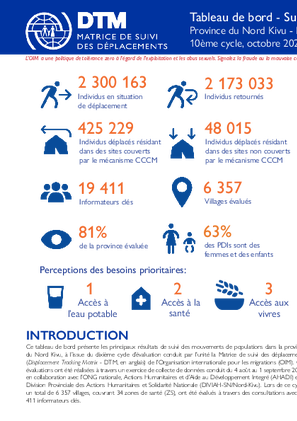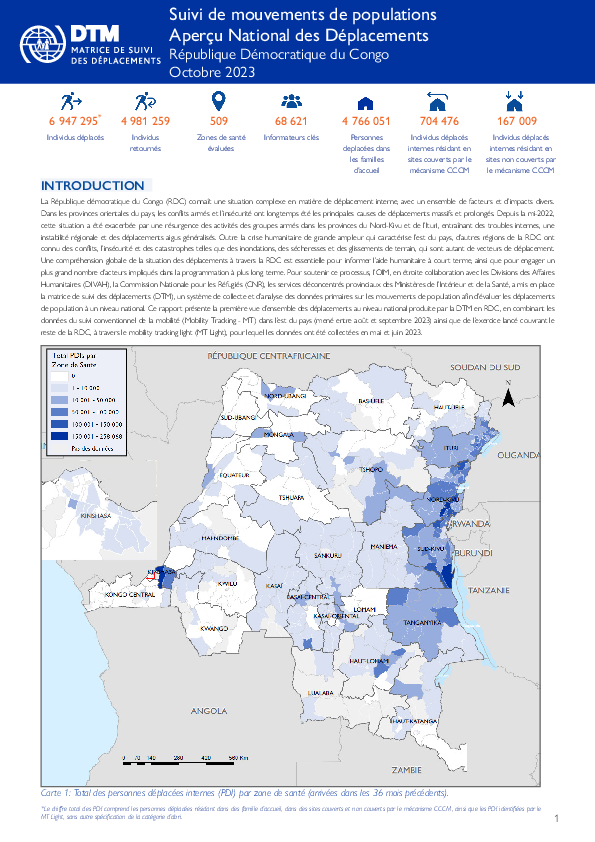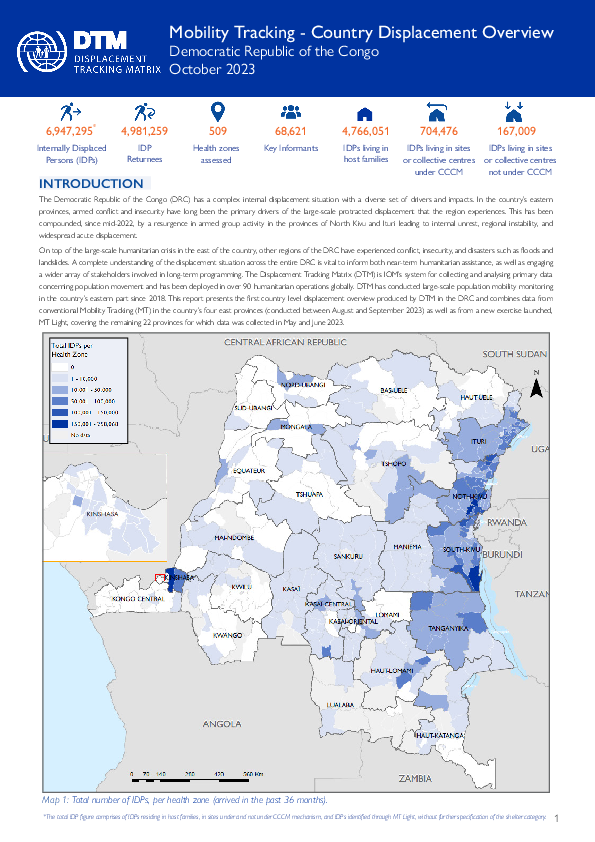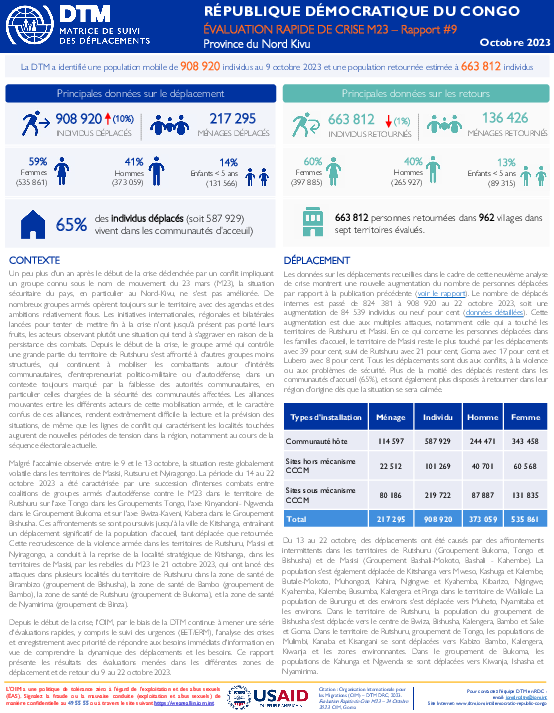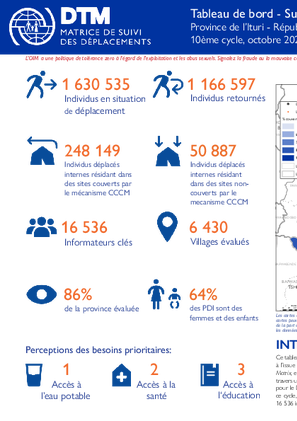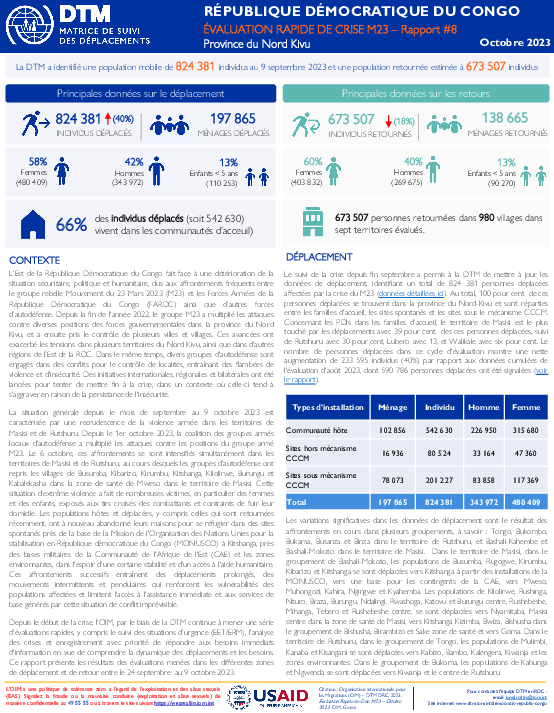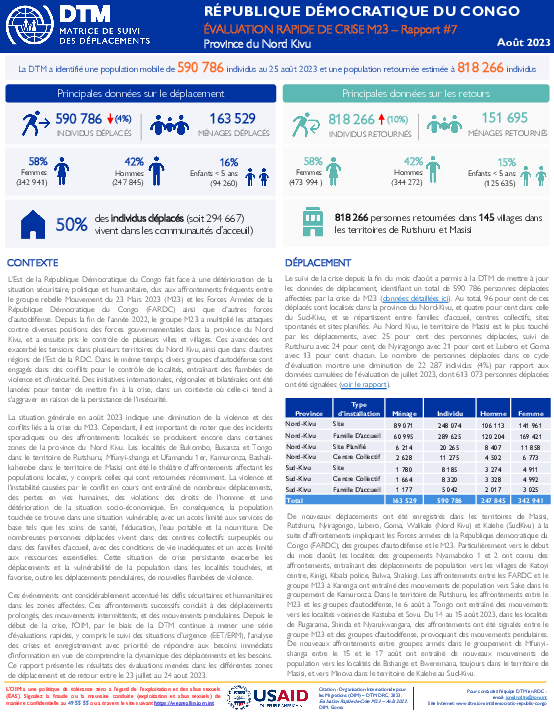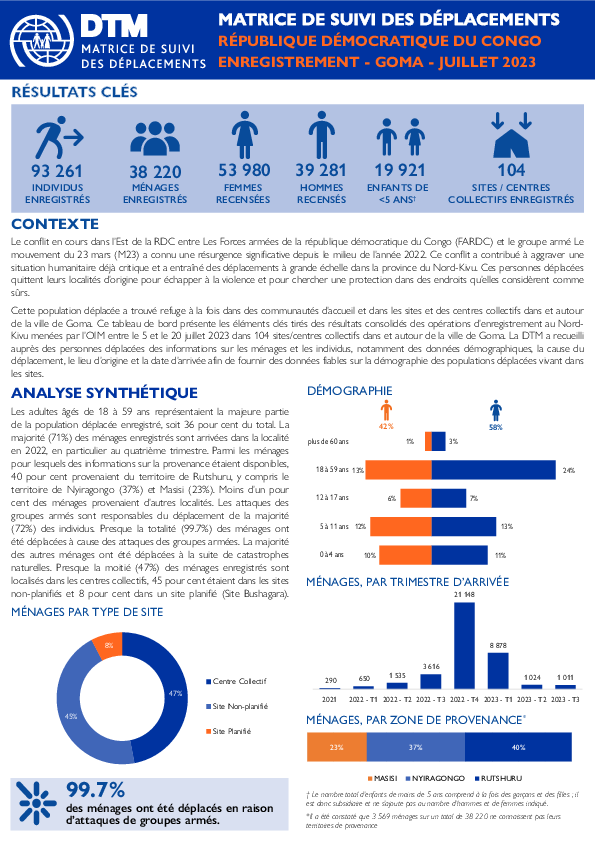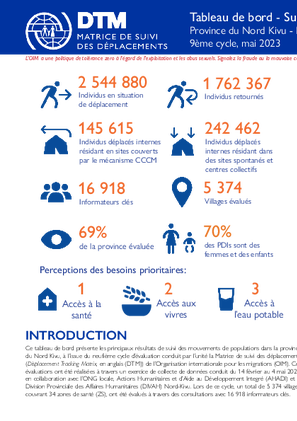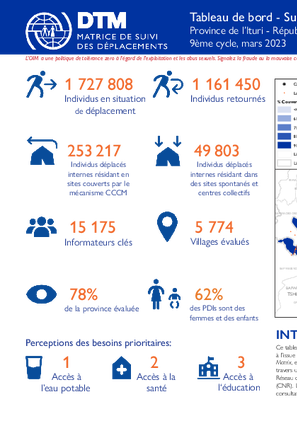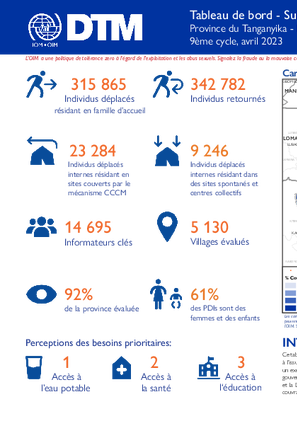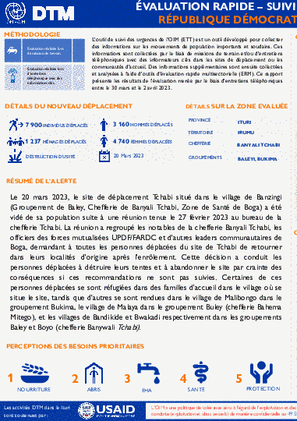-
Countries
-
Data and Analysis
-
Special Focus
-
Crisis Responses
Democratic Republic of the Congo
Democratic Republic of the Congo
Desplazados internos rastreados
Movimientos de desplazamiento
6,734,000
IDMC 2023
Ronda de recopilación de datos
Sobre Democratic Republic of the Congo
The Displacement Tracking Matrix (DTM) is a system to track and monitor the displacement and population mobility. It is designed to regularly and systematically capture, process and disseminate information to provide a better understanding of the movements and evolving needs of displaced populations, whether on site or en route. In the DRC, the DTM was first activated in 2013 in response to the displacement crisis caused by the M23 rebellion in North Kivu. IOM in the Democratic Republic of Congo, using the 4 components of the DTM, collects, analyses and disseminates crucial information on the mobility, vulnerabilities and needs of displaced populations in 9 provinces of the country: North Kivu, South Kivu, Lomami, Kasai, Kasai Oriental, Sankuru, Ituri and Tanganyika. The information collected through the DTM in the DRC allows government and humanitarian actors to provide targeted and context-specific assistance related to mobility.
- Registration: information collected from each displaced person in displacement sites. This information makes it possible to identify displaced persons and to provide targeted assistance to households;
- Surveys: allow IOM to verify information gathered from displaced populations and gather specific information through population sampling, to improve the overall understanding of the beneficiaries;
- Mobility tracking: estimates made periodically about the number of displaced populations and returnees to specific target areas. This allows the various humanitarian actors and decision-makers to have a reliable overview of the scale of displacement and the dynamics of returns.
- Flow monitoring: the tool which IOM uses to assess displaced populations at key entry and transit points along migratory routes commonly used in areas affected by the Ebola Virus epidemic. The objective is to collect information on the origins and destinations of populations in order to anticipate, detect and report potentially dangerous migratory movements that could lead to the spread of Ebola virus disease.
All DTM activities in the Democratic Republic of Congo are implemented in close coordination with specialized Congolese government structures and with the support of national NGOs.
Contacto
DTM Support
iomdrcdtm@iom.int
Current Donors
- Canada (DFATD)
- SIDA
- BHA
- CERF
- USAID
- ECHO
Para obtener resultados de búsqueda más avanzados, vaya a la Página de búsqueda avanzada de informes
RDC — Nord Kivu: Suivi des mobilités 10 (Octobre 2023)
Ce tableau de bord présente les principaux résultats de suivi des mouvements de populations dans la province du Nord Kivu, à l’issue du dixième cycle d’évaluation conduit par l’unité la Matrice de suivi des déplacements (Displacement Tracking Matrix - DTM, en anglais) de l’Organisation internatio
RDC — Sud Kivu: Suivi des mobilités 11 (Octobre 2023)
Ce tableau de bord présente les principaux résultats de suivi des mouvements de la population dans la province du Sud-Kivu à l’issue du dixième cycle d’évaluation conduit par la Matrice de suivi des déplacements (Displacement Tracking Matrix - DTM en anglais) de l’OIM.
RDC — Tanganyika: Suivi des mobilités 10 (Octobre 2023)
Ce tableau de bord présente les principaux résultats de suivi des mouvements de populations dans la province du Tanganyika, à l’issue du dixème cycle d’évaluation conduit par l’unité Matrice de suivi des déplacements (Displacement Tracking Matrix - DTM, en anglais) de l’Organisation international
RDC – Aperçu National des Déplacements (Octobre 2023)
La République démocratique du Congo (RDC) connaît une situation complexe en matière de déplacement interne, avec un ensemble de facteurs et d’impacts divers.
DRC – Countrywide Displacement Overview (October 2023)
The Democratic Republic of the Congo (DRC) has a complex internal displacement situation with a diverse set of drivers and impacts.
RDC — Nord Kivu: Évaluation Rapide de Crise M23 (24 Octobre 2023)
Depuis le début de la crise M23, l'OIM, par le biais de la DTM continue à mener une série d'évaluations rapides, y compris le suivi des situations d’urgence (EET/ERM), l'analyse des crises et enregistrement avec priorité de répondre aux besoins immédiats d'information en vue de comprendre la dyna
RDC — Ituri: Suivi des mobilités 10 (Octobre 2023)
Ce tableau de bord présente les principaux résultats de suivi des mouvements de populations dans la province de l’Ituri, à l’issue du dixième cycle d’évaluation conduit par l’unité la Matrice de suivi des déplacements (Displacement Tracking Matrix, en anglais (DTM)) de l’Organisation internationa
RDC — Nord Kivu: Évaluation Rapide de Crise M23 (Octobre 2023)
Depuis le début de la crise M23, l'OIM, par le biais de la DTM continue à mener une série d'évaluations rapides, y compris le suivi des situations d’urgence (EET/ERM), l'analyse des crises et enregistrement avec priorité de répondre aux
RDC — Nord Kivu: Évaluation Rapide de Crise M23 (Août 2023)
Ce rapport présente les résultats des évaluations menées dans les différentes zones de déplacement et de retour entre le 23 juillet et 24 août 2023. Le suivi de la crise depuis la fin du mois d'août a permis à la DTM de mettre à jour les données de déplacement, identifiant un total de 590 78
RDC — Tanganyika : Rapport d'Enregistrement — Kongolo (Juillet - Aout 2023)
Ce tableau de bord présente les éléments clés qui ressortent des résultats consolidés des opérations d’enregistrement dans la province du Tanganyika menées par l’OIM par le biais de sa matrice de suivi des déplacements (DTM) en coopération avec la Division des Affaires Hum
Aug 22 2023
RDC — Tanganyika : Rapport d'Enregistrement —…
RDC — Nord-Kivu: Rapport d'Enregistrement — Goma (Juillet 2023)
Ce tableau de bord présente les éléments clés tirés des résultats consolidés des opérations d’enregistrement au Nord-Kivu menées par l’OIM entre le 5 et le 20 juillet 2023 dans 104 sites/centres collectifs dans et autour de la ville de Goma.
Aug 22 2023
RDC — Nord-Kivu: Rapport d'Enregistrement — G…
RDC — Nord Kivu: Évaluation Rapide de Crise M23 (Juillet 2023)
Ce rapport présente les résultats des évaluations menées dans les différentes zones de déplacement et de retour entre le 26 juin au 23 juillet 2023.
RDC — Nord Kivu: Évaluation Rapide de Crise M23 (Juin 2023)
Ce rapport présente les résultats des évaluations menées dans les différentes zones de déplacement et de retour entre le 17 et le 25 juin 2023. L'analyse de la crise de juin a permis
DRC – Suivi des mobilités Round 2 Atlas (Mai 2023)
L'OIM - par le biais de la matrice de suivi des déplacements (DTM) - a mené des évaluations de suivi de la mobilité (MT) depuis 2018.
DRC – Mobility Tracking Round 2 Atlas (May 2023)
IOM - through the Displacement Tracking Matrix (DTM) - has conducted Mobility Tracking (MT) assessments since 2018.
Jun 22 2023
DRC – Mobility Tracking Round 2 Atlas (May 2023)
RDC — Tanganyika : Rapport d'Enregistrement (27 Octobre 2022)
Cette fiche d’information présente les éléments clés tirés des résultats consolidés des opérations d’enregistrement menées par l’OIM en date du 27 octobre 2022 dans les sites de déplacement, BETANIA et HEMBA SABA, dans le territoire de
Jun 16 2023
RDC — Tanganyika : Rapport d'Enregistrement (…
RDC — Goma et Nyiragongo : Rapport d'Enregistrement Continu (Mai 2023)
Cette fiche présente les éléments clés tirés des résultats consolidés des opérations d'enregistrement au Nord-Kivu menées par l'OIM et son partenaire entre le 8 et le 31 mai 2023
Jun 13 2023
RDC — Goma et Nyiragongo : Rapport d'Enregist…
RDC — Nord Kivu: Suivi des mobilité 9 (Mai 2023)
Ce tableau de bord présente les principaux résultats de suivi des mouvements de populations dans la province du Nord Kivu, à l’issue du neufième cycle d’évaluation conduit par l’unité la Matrice de suivi des déplacements (Displacement Tracking Matrix, en anglais (DTM)) de l’Organisation internati
Jun 13 2023
RDC — Nord Kivu: Suivi des mobilité 9 (Mai 2023)
RDC — Sud Kivu: Suivi des urgences 113 (Mai 2023)
Les fortes pluies suivies de vents violents survenues le 4 mai 2023 dans le village de Bushushu, groupement de MbingaSud, chefferie de Buhavu, territoire de Kalehe, dans la province du Sud-Kivu ont provoqué d'importantes inondations des rivières Cishova, Lwano, Nyamukubi, Kabushungu et Cabondo.
RDC — Ituri: Suivi des mobilites 9 (Mars 2023)
Ce tableau de bord présente les principaux résultats de suivi des mouvements de populations dans la province de l’Ituri, à l’issue du neufième cycle d’évaluation conduit par l’unité la Matrice de suivi des déplacements (Displacement Tracking Matrix, en anglais (DTM)) de l’Organisation internation
May 24 2023
RDC — Ituri: Suivi des mobilites 9 (Mars 2023)
RDC — Sud Kivu: Suivi des mobilité 10 (Avril 2023)
Ce tableau de bord présente les principaux résultats de suivi des mouvements de la population dans la province du Sud-Kivu à l’issue du dixième cycle d’évaluation conduit par la Matrice de suivi des déplacements (Displacement Tracking Matrix en anglais (DTM)) de l’OIM.
RDC — Tanganyika: Suivi des mobilités 9 (Mars 2023)
A l’issue du neufième cycle d’évaluation conduit par l’unité DTM de l’OIM. Ces évaluations ont été réalisées à travers un exercice de collecte de données conduit du 20 février au 15 mars 2023, en collaboration avec l’Organisation nongouvernmentale
RDC — Sud Kivu: Suivi des urgences 112 (25 avril 2023)
Depuis le 4 février 2023, les attaques du groupe armé M23 (M23) se sont multipliées contre les forces armées de la République démocratique du Congo (FARDC) à l’Est de la RDC aux environs de la cité de Sake dans les villages de Karenga, Kabati, et Kingi (groupement de Kamuronza, territoire de Masi
RDC — Ituri: Suivi des urgences 111 (30 mars - 24 avril 2023)
Le 20 mars 2023, le site de déplacement Tchabi situé dans le village de Banzingi (Groupement de Baley, Chefferie de Banyali Tchabi, Zone de Santé de Boga) a été vidé de sa population suite à une réunion tenue le 27 février 2023 au bureau de la chefferie Tchabi.
Pagination
Para obtener resultados de búsqueda más avanzados, vaya a la Página de búsqueda avanzada de conjuntos de datos
Baseline Assessment — Tanganyika — Round 11 (Cycle 5)
2021-05-12
A baseline assessment is a sub-component of mobility tracking. It aims to collect data on IDP, migrant or returnee population presence in a defined administrative area of the country.
Baseline Assessment — Nord Kivu — Round 41 (Cycle 6)
2021-04-20
A baseline assessment is a sub-component of mobility tracking. It aims to collect data on IDP, migrant or returnee population presence in a defined administrative area of the country.
Baseline Assessment — Ituri — Round 5
2021-04-12
A baseline assessment is a sub-component of mobility tracking. It aims to collect data on IDP, migrant or returnee population presence in a defined administrative area of the country.
Baseline Assessment - South Kivu Round 6
2021-04-09
A baseline assessment is a sub-component of mobility tracking. It aims to collect data on IDP, migrant or returnee population presence in a defined administrative area of the country.
Baseline Assessment — Tanganyika — Round 10 (Cycle 4)
2020-12-31
A baseline assessment is a sub-component of mobility tracking. It aims to collect data on IDP, migrant or returnee population presence in a defined administrative area of the country.
Baseline Assessment - Kasai Central - Round 7
2020-12-29
A baseline assessment is a sub-component of mobility tracking. It aims to collect data on IDP, migrant or returnee population presence in a defined administrative area of the country.
Baseline Assessment - South Kivu Round 5
2020-12-14
A baseline assessment is a sub-component of mobility tracking. It aims to collect data on IDP, migrant or returnee population presence in a defined administrative area of the country.
Baseline Assessment — Ituri — Round 4
2020-10-28
A baseline assessment is a sub-component of mobility tracking. It aims to collect data on IDP, migrant or returnee population presence in a defined administrative area of the country.
Baseline Assessment — Ituri — Round 3
2020-03-31
A baseline assessment is a sub-component of mobility tracking. It aims to collect data on IDP, migrant or returnee population presence in a defined administrative area of the country.
Baseline Assessment — Nord Kivu — Round 39 (Cycle 5)
2020-02-23
A baseline assessment is a sub-component of mobility tracking. It aims to collect data on IDP, migrant or returnee population presence in a defined administrative area of the country.
Coming Soon!!! Baseline Assessment — Tanganyika — Round 9
2020-01-28
A baseline assessment is a sub-component of mobility tracking. It aims to collect data on IDP, migrant or returnee population presence in a defined administrative area of the country.
Baseline Assessment - South Kivu Round 4
2020-01-06
A baseline assessment is a sub-component of mobility tracking. It aims to collect data on IDP, migrant or returnee population presence in a defined administrative area of the country.
Baseline Assessment — Ituri — Round 2
2019-10-12
A baseline assessment is a sub-component of mobility tracking. It aims to collect data on IDP, migrant or returnee population presence in a defined administrative area of the country.
Baseline Assessment — Tanganyika — Round 8
2019-10-12
A baseline assessment is a sub-component of mobility tracking. It aims to collect data on IDP, migrant or returnee population presence in a defined administrative area of the country.
Baseline Assessment — Nord Kivu — Round 38 (Cycle 3)
2019-10-12
A baseline assessment is a sub-component of mobility tracking. It aims to collect data on IDP, migrant or returnee population presence in a defined administrative area of the country.
Site Assessment — North Kivu — Round 37
2019-07-30
A site assessment is a sub-component of mobility tracking. It aims to collect data on population presence, living conditions and needs in a particular displacement site or community.
Site Assessment — North Kivu — Round 36
2019-06-30
A site assessment is a sub-component of mobility tracking. It aims to collect data on population presence, living conditions and needs in a particular displacement site or community.
Site Assessment — North Kivu — Round 35
2019-05-30
A site assessment is a sub-component of mobility tracking. It aims to collect data on population presence, living conditions and needs in a particular displacement site or community.
Site Assessment — North Kivu — Round 34
2019-05-30
A site assessment is a sub-component of mobility tracking. It aims to collect data on population presence, living conditions and needs in a particular displacement site or community.
Baseline Assessment — North Kivu — Round 35 (Cycle 2)
2019-05-16
A baseline assessment is a sub-component of mobility tracking. It aims to collect data on IDP, migrant or returnee population presence in a defined administrative area of the country.


